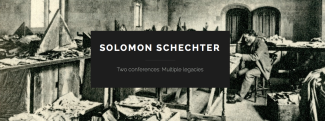Event

Solomon Schechter’s Life and Legacy: American Transformations (1902–1915)
Monday, March 16, 2015
All events will take place at the National Museum of American Jewish HistorySchedule of Events
Scholarship on a Mission: Schechter’s Significance a Century Later
1:00–1:30 pm
Steven Weitzman, Ella Darivoff Director of the Herbert D. Katz Center of Advanced Judaic Studies, University of Pennsylvania
Michael A. Meyer, Hebrew Union College–Jewish Institute of Religion in Cincinnati / Katz Center for Advanced Judaic Studies
Ancient Texts, Modern Insights: Schechter between the Past and Future of Jewish Studies
1:30–2:30 pm
Chair: Elliott Horowitz, Jewish Quarterly Review
Ismar Schorsch, Chancellor emeritus of the Jewish Theological Seminary of America / Katz Center for Advanced Judaic Studies
“From Cairo to Qumran: A Triumph of Schechter’s Intuition”
Mirjam Thulin, Leibniz Institute of European History, Mainz / Katz Center for Advanced Judaic Studies
“Schechter between Europe and America”
[2:30–2:45 pm coffee break]
New York as New Yavne: Schechter and American Judaism
2:45–3:45 pm
Chair: Jack Wertheimer, Jewish Theological Seminary of America
Shuly Rubin Schwartz, Jewish Theological Seminary of America
“Solomon Schechter in America—and of America”
David Starr, Brandeis University
“A Judaism of the People? Schechter’s Experiment with a ‘Catholic Israel'”
Thirsting for the Future: The Legacies of Solomon Schechter
4:00–5:30 pm
Chair & respondent: Jonathan Sarna Brandeis University
Roundtable:
Arnold M. Eisen, Chancellor of the Jewish Theological Seminary of America
David Ellenson, Chancellor, and president emeritus of the Hebrew Union College-Jewish Institute of Religion / New York University
Beth S. Wenger, University of Pennsylvania
[ 5:45–7:15 pm dinner break]
The Past That Lives within the Present: Schechter’s Time Capsule—And Ours
7:30 pm
Dara Horn, novelist
SYMPOSIUM WEBSITE: http://schechterlegacy.com/philadelphia-events/
Sponsored by the Herbert D. Katz Center for Advanced Judaic Studies, with Jewish Theological Seminary, National Museum of American Jewish History,Penn's Jewish Studies Program, and Jewish Quarterly Review.
